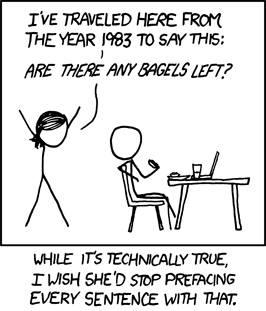Ergotopographs
Back in July, the New Scientist's Feedback page reported that
THE powers that be at Guy Robinson's place of work insist that employees tell the office if they're "working from home". Human laziness being what it is – sorry, we meant to say "the employees being committed to maximising productivity in a forward-looking sense" – the welter of emails on Monday mornings got shortened to the three letters "WFH". Then someone was stuck working at an airport and sent the message "WFA".
Then, given the insistence by the virus that is language on mutating whenever possible, the changes poured in and escaped the limitations of the alphabet: "WFT" working on a train, "WF\__" working from a sunlounger (not being smug or anything) and "WF\_O__/" working from a plane (ditto).
Guy's colleagues suggest "WF#" for "working from prison", but they have not needed to use this, yet. Feedback suggests a few others: "WF=====" for working at a linear accelerator and "WF() – -()" for working in a laser lab (with lenses).
Read the rest of this entry »

